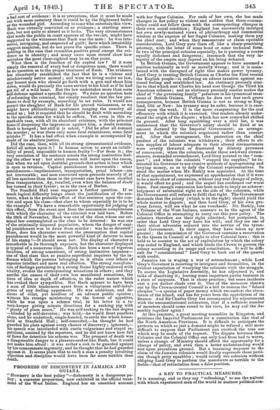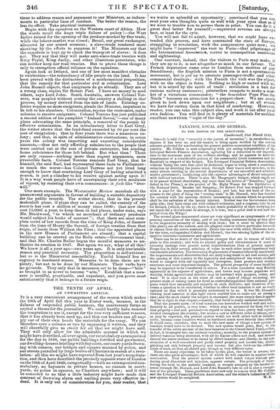A KEY TO PRACTICAL MEASURES.
IT is amusing, and as they say "refreshing," to see the naivete with which experienced men of the world in matters political con-
tinue to address reason and argument to our Ministers, as induce- ments to particular lines of conduct. The better the reason, the less its effect. Take practical instances.
Begin with the squadron on the Western coast of Africa. How the words recall the huge triple failure of policy !—the West Indies ruined for the opening of the produce-market by free trade, while the labour-market was closed ; Brazil, our great exchanger, alienated by our armed sermons; a slave-trade rendered more shocking by the efforts to suppress it! The Ministers say that the squadron is kept up to check the transport of slaves: it does not. They say that they will make anti-slave-trade treaties with King Pepu], King Jacky, and other illustrious potentates, who can neither keep nor read treaties. But to prove these things is only to strengthen official reliance on the squadron. Again look at Ireland, and one of her most manifest obstacles to extrication—the redundancy of idle people on the land. It has been proved with the distinctness of a mathematical proposition, that the remedy for that particular evil is colonization. Lord John Russell objects, that emigrants do go already. They are of a wrong class, replies Sir Robert Peel. I have no money to send others, says Lord John. South Australia, answers Colonel Tor- rens, was peopled without costing the country a shilling in that process, by money derived from the sale of lands. Existing co- lonies require no more emigrants, pleads the Minister, impatient to be left to his slumbers. Colonization, rejoins the economist, makes colonies to receive emigrants. Colonel Torrens has just published a second edition of his pamphlet "Ireland Saved,"—one of many plans advocating the same principle, a removal of the people by effective colonization. In an introductory letter to Earl Grey, the writer shows that the land-fund exceeded by 50 per cent the cost of emigration; that in four years there was a numerous co- lony; and that, in spite of administrative obstructions, in seven years the colony was importing and exporting considerable amounts,—thus not only affording subsistence to the people that were carried out at the cost of private enterprise, but sending home subsistence for those left behind. But what then ? These are only reasons—nothing more than cogent arguments, mere irresistible facts. Colonel Torrens reminds Earl Grey, that he himself, the said Earl, had represented these facts to Parliament : so much the worse—has Colonel Torrens not yet lived long enough to know that convicting Lord Grey of having admitted a reason, is just a clincher to his resolve against acting upon it? It is a way weak people have of ascertaining their own modicum of vigour, by resisting their own consciences : it feels like "free- will."
One more example. The Westminster Review marshals all the unanswered arguments in favour of building a suitable depository for the public records. The writer shows, that in the present makeshift plans, if plans they can be called, the custody of the records has cost a million of money since 1800; that now they cost 15,0001. a year, to keep them in bad places, under risks, says Mr. Braidwood, "to which no merchant of ordinary prudence would subject his books of account "; that there are most com- plete series of law records from the time of King John, of finance from the time of Henry the Second, of foreign treaties from that reign, of lands from William the First ; that the appointed places in the new Houses of Parliament are absurd ; that a capital building can be erected on the Rolls estate—Government land; and that Mr. Charles Buller began the needful measures to au- thorize its erection in 1847. But again we say, what of all this? We knew it all a year ago—two years ago. It is only irrefutable reason and practical necessity. The proposition is self-evident ; but so is the Ministerial insensibility. Euclid himself has no cogency to hardened senses. Measures to be done there are in plenty, but not to be done by our Ministers. Their verbs have no gerunds. They only deal in measures not to be done—" bills" so brought in as never to become "acts." Establish that a mea- sure is needful, practicable, and expedient, and you prove most satisfactorily that it belongs to a future reign.



























 Previous page
Previous page